Written by: Travis Thompson and Keoki Lau
Interviews done by: Travis Thompson, Beth Black, and Keoki Lau
Author’s Note:
I think there’s a common theme among young artists from Seattle, there are certain things we all want to accomplish to feel like we’ve, for lack of a better phrase, “made it”. Like, sell out The Crocodile, or read about ourselves in The Stranger, or get a signature burger of the week at Lil’ Woody’s, or of course, see our name on the lineup of the annual Bumbershoot Arts and Music Festival. When I pitched this article to Arts Corps I secretly just wanted to meet some of my favorite musicians and ask them the questions I’ve always wondered. But once they agreed and the time came to start preparing, it became something completely different for me. I realized how lucky I was…to have the opportunity to have my voice heard, to be able to speak to those who’ve inspired me, and many others alike. I didn’t want to ask about rap beef, or when the next album was coming out…I wanted to ask artists why districts should invest in art education or why they think youth should be attending open-mics. I wanted to create something young artists could look back on for inspiration to keep going, and a reminder that they aren’t alone. So, don’t think of this as an article of interviews, think of it as a ‘How-to guide on how to get your name on the Bumbershoot Lineup’. I hope you enjoy it.
-Travis Thompson
Sam Lachow
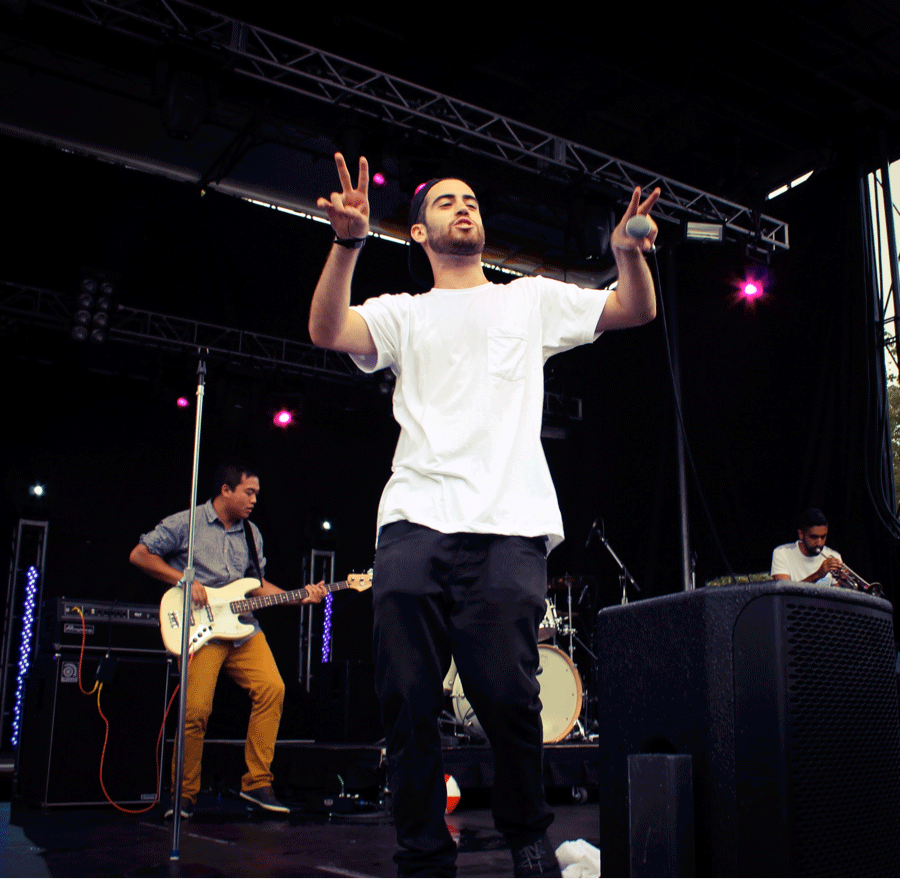
Q: “Is it hella’ annoying having people constantly stopping you to say hi, and also saying “Sam Lachow” all the time instead of just “Sam”?
A: “Uhm, No. Haha. To me it’s the business, its part of the job. It’s awesome! At least it’s not annoying yet! Haha! I’m not that big yet! Maybe in the future it will get annoying as shit, but for right now its cool! Haha”.
Q: How old were you when you realized you wanted to pursue music as a career?
A: “Pretty old. Haha. I did music for so long. It was my career. You know, all throughout middle school and high school I was making cd’s…but uhm, it never seemed like something that could be a real career. It was just rap music. So I bullshitted, trying to do a year of college to get some stupid degree, when I knew deep down I didn’t wanna’ do that shit, but it just felt right. And then, it was probably after my first year of college when I said, “what am I doing? I gotta’ buckle down and focus on what I’ m actually doing”. You know? Cause I would go to class and instead of doing homework, I would just go home and make music. I tricked myself into believing that it couldn’t be my career, when I knew it always was. If that makes sense”.
Q: What kind of environment do you have to be into be creative? What’s the setting when you’re writing?
A: “I don’t usually don’t just go into a studio like “I’m just gonna’ make a song from scratch right now”. I usually get inspired…like maybe I’ll hear some music that really speaks to me, or have an idea. And then I’m like “oh shit I gotta’ do this right now”. I usually stay at home when I’m making beats, but when I’m writing lyrics: Like, when I’m in New York I’ll write on the subway, or when I’m in Seattle I’ll go to a coffee shop or something. I like being around people. It’s way more inspiring than just sitting in a little room.
Q: What music is inspiring you right now?
A: “Hmmm That’s a tough one. I’ve been listening to a lot of old funk and soul. Marvin Gaye a lot. They inspire me so much when it comes to making melodies. And then I just sort of, “hiphopify” it, you know? When it comes to rap I’m really inspired by Andre 3000, Tech N9ne- I just think the way he compiles flows is the best. Probably a lot of others too”.
Q: How has being a creative [musician] shaped your life positively, and negatively?
A: “The negative is that it’s all I love doing. I’m miserable when I’m working a regular job. Its kind of a blessing and a curse, Like, I have to be working on some sort of art- whether it’s video, or music…or else I’m just depressed pretty much. So it’s not really something I choose to do, it’s something I kind of have to do. But the fact that it’s become my job, there’s really no negative side to that. But I guess the main negative is that I don’t have a steady paycheck. You know, I’m not always positive I’ll be able to cover rent this month. Sometimes I way more than cover it and that’s great! But other times, it’s hard. It’s not steady. I guess that’s the only thing”.
Q: What are some common misconceptions people have of you? For example, one could be: assuming you just have hella’ money all the time. Haha.
A: I guess people just forget how much you actually have to spend on shit. Studio time is like, 50 bucks an hour. And you can imagine how many hours it takes to make a full album. Especially when I’m making all the beats from scratch. I’m not just going in there and rapping, one song could take days. Another one that annoys me, is that people think that in rap, all you’re trying to do is become the biggest. They think that all rap is, is a game. They tend to forget the music part of it. I”m doing this because I love it, not just because I’m trying to win or defeat people. People are always like “You’re gonna’ blow up soon”! And that sorta’ bugs me because, that’s not all I’m tryna’ do! I’d rather you compliment my music. These are good questions man; I’ve never answered these.
Q: So, we’re from Youth Speaks and we’re constantly at open mics, and poetry slams, how important do you feel those are to the city? Or a community, in general.
A: For sure, I hear about you guys all the time…Huge! I never got started doing those kinds of things in Seattle, but when I lived in New York open mics were what I started doing. I know Raz [Simone] was huge on that, and Seattle has a crazy amount of talented poets. A Bunch of people huge in the rap scene now started as poets, or slam poets. George Watsky who was on my album was a slam poet. But also it just builds the community together, especially with the young people. That’s something Seattle has always been really good at. I’ve had a solid foundation and community since I was young, because of programs like your guys’. Like The Vera Project n’ shit.
Q: When you first started making music, where were you drawing inspiration to keep going?
A: I mean again, its sorta what I said before: I kinda’ had to. What really kept me going is when I saw people connect to it, which we didn’t really expect. I was in a group called “Shankbone”. And we would sell cd’s I mixed and mastered myself, you know, they sounded like shit but like, I could tell people really connected to it. It’s not like it was good music but for some reason people learned all the words, and the enjoyed it. And we would sell them in the hallways and the it was just like “lets make another one”. And it took off from there”.
Q: Any last advice to youth pursuing art as a career?
A: “One of the biggest mistakes I made was not figuring out how to make art a part of my schooling. Instead of doing my homework, I would make music all night. And then teachers would call me lazy and I’d be like “Mothafucka I just made 4 songs last night, I’m working!” But I could have found a way to make that [the music] a part of my curriculum. So advice: don’t think of school and art as completely separate. Whatever you passionate about, there’s a lane.
SZA
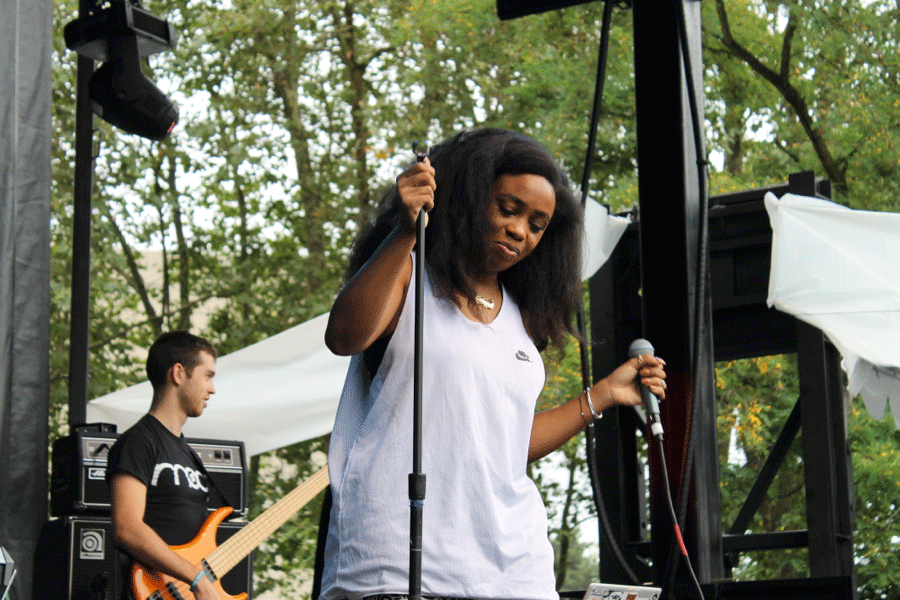
Q: At what age did you realize that music was your passion, and that you wanted to pursue it as a career?
A: “That was only like 2 years ago! Haha! I wanted to be in marketing but I just couldn’t keep a job, really. So, this was like the only thing I didn’t have to be on time for”.
Q: How did you start to realize it?
A: “My friends forced me into it! Basically my friends were just like “dude, you have to sing” and I was like “really are you sure”? And it was all pretty much an accident, really”.
Q: What space do you have to be in to create? Or what’s the setting when you’re writing?
A: Usually I’m somewhere that’s stress free. Just totally honest and relax. And a little weed never hurt! Haha”!
Q: So we’re from a poetry organization and we’re constantly at open mics and poetry slams; how important do you feel those are to a city or a community?
A: “I think it’s so important! I used to go to the Nuyorican Poetry Café with my dad. That was my shit! That’s was my scene. I fucked with that and I respect that you guys have a presence, it’s so important and you will get peace from it”.
Q: What music inspires you?
A: “Music that inspired me and continues to inspire me is just people that break rules, or pioneer something. Like, Björk, Jamiroquai, and Marvin Gaye”.
Q: Any last words for youth that are pursuing art as a career?
A: “Don’t listen to anybody. Ignore everyone at all times. Be steadfast. It wont be easy”.
Big Freedia
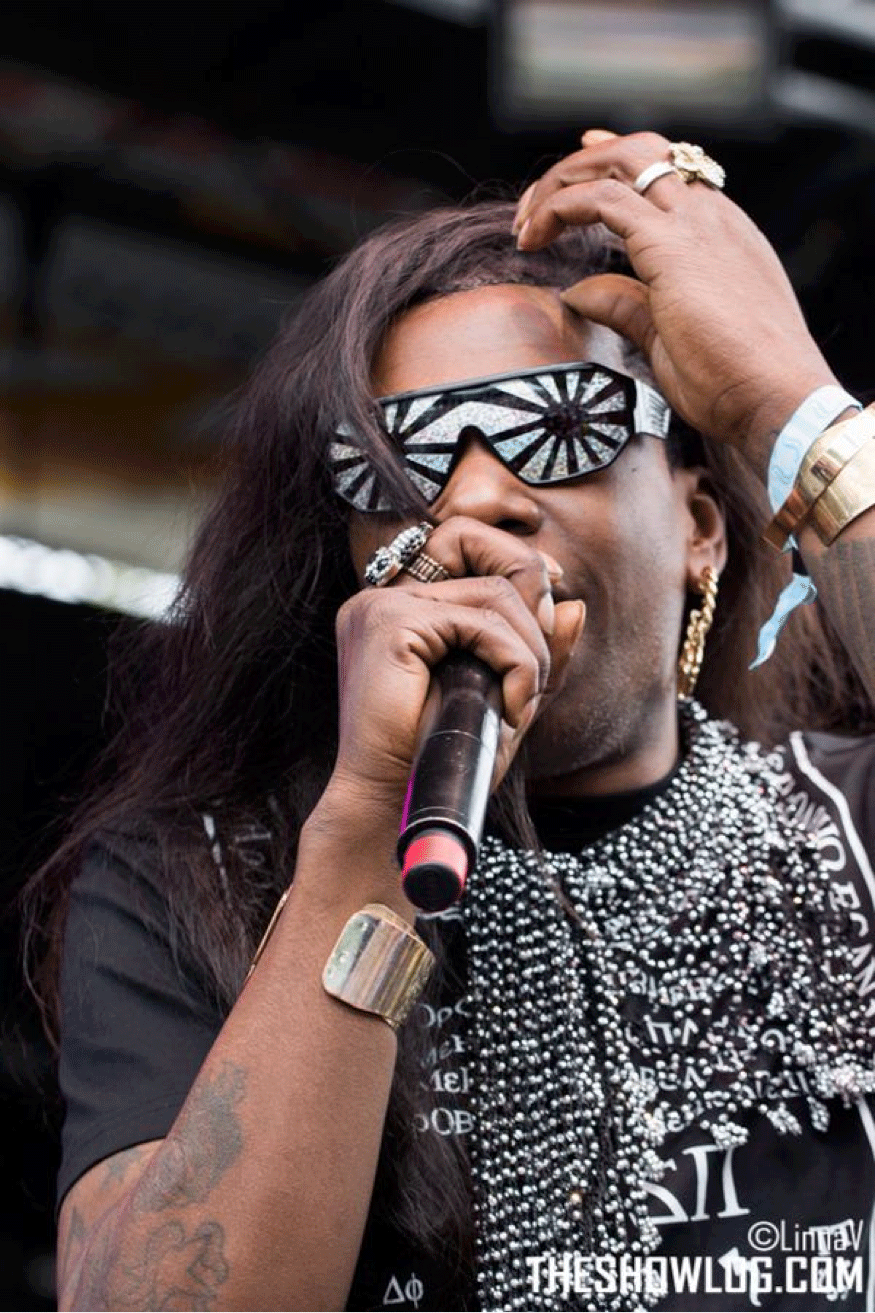
Q: How old we’re you when you realized you wanted to pursue music as a career?
A: “Well I started singing when I was six or seven. So I started really early. I was singing gospel in the church choir. But when I really decided to start with bounce music, I was about 21””.
Q: What was inspiring you in the early days to keep going?
A: “The music. It was the most important. You have to love what you do. And singing at church every weekend. It wasn’t an everyday thing. But I would go in once a week and had fun every time”.
Q: What space do you have to be in to create? What’s the setting when you’re writing?
“It depends on where I’m at. If I’m at the studio I’ll go in and start listening to different music, and then I’ll start getting inspired. I might pull out my tablet, I might start writing, or I might just start freestyling, you know? And somebody in the studio might give me an idea, or I might already have some ideas in my head…there’s so many different way to make a beat or prepare to start making a song. And the way that I do it, is I go in, and the producer puts on a track, and I just go from there”.
Q: How important do you think it is for youth to engage in activities like Youth Speaks or poetry events, or open mics?
A: “It’s very important because it opens your mind and it opens you to a lot of different avenues for things that you can be involved in, and things that will help you be successful in the future. All of those things can help you open up different doors and give you different experiences to be able to be ready for the world”.
Q: Any last advice to youth who are pursuing music as a career?
A: “Just be yourself, and enjoy what you do, and have fun with it, and the rest will follow”!
Wu Tang
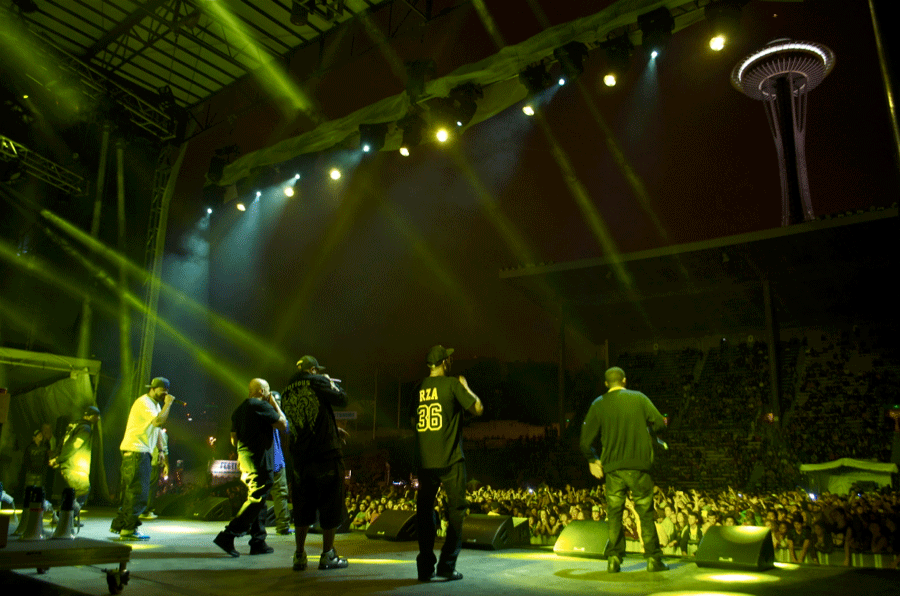
Cappadonna
Q: How old were you when you realized music was your passion?
A: “I say around, 25-30 maybe. 30 years old. I decided that this is what I wanna do. Not necessarily making it into a career, but just something that I wanted to do. My first venture was ‘Ice Cream’ I did that Ice Cream song with Ghostface and Raekwon. And then I got a contract for RZA…I think it was a publishing contract, and that was the first time I ever seen a contract! For musical anything! And that right there gave me some initiative to learn all about the business and about being an artist. I kind of grew into the business. I started very young. I was rappin’ when I was 9 but then it just trickled on until around 30 and then it got serious. And now I’m here”.
Q: So we’re from a poetry organization and we’re constantly at open mics and poetry slams; how important do you feel those are to a city or a community?
A: “Well, it’s a form of self-expression. And you know, every art has its own identity and you cant really change the art or try to put it in any kind of category. You just gotta kind of embrace it and try to define yourself within that art. That’s why art is more universal to me, than anything. But it definitely represents a piece of culture, because a lot of times you relate art to your surroundings. We’re from the urban area so we focus on urban artistry, you know? we rap about poverty, we rap about hustling, about hard times in the projects, as well as some of the good times too. It’s all really based upon that urban foundation”.
Q: What advice do you have to young artists who kind of want to test the waters in the [music] industry?
A: “That’s a good question, I would really say: test the waters. Don’t just go diving in thinking you’re a rap star overnight. It can take a long time. I been rapping since I was 9. And I told y’all I got on when I was 30 so how many years is that? And again, this ain’t something I was looking for. This is something I found I had to do, something I loved to do. And that’s the reason I did it. And everything else came afterwards. It was more like a blessing in disguise. I feel like to be this kind of creative you have to like what you love, and love what you like in order for it to be effective”.
Inspectah Deck
Q: How old were you when you realized you wanted to pursue music as a career?
A: “Wow, I think I was about 20 maybe. I used to do it for fun, and then somebody told me I should do it seriously because I was good. But you know, I still never really took it serious, haha”.
Q: So we’re from a poetry organization and we’re constantly at open mics and poetry slams; how important do you feel those are to a city or a community?
A: “That’s how I got my name! Crashing talent shows and what not! Whatever was going on, if it had some type of showcase, or MC or something to do with that, I had to be there! Especially if you’re trying to get yourself out there! When I came up there was YouTube or this Internet wave, so people really had to see, feel, and touch you. Yeah, I had to go to it. I didn’t give a fuck! Talent show, open mic in the next part of town, friends or enemies were gonna’ be there…I was there”!
Q: What advice do you have for youth finding their footing in the music business?
A: “Be yourself, man! I come from an era where biting [copying] was illegal! Where trying to sound like, look like, or be like somebody else was against the law! Trying to be the same is how the industry makes a fast buck. If they don’t want you, they can grab somebody else just like you. So, I’m saying to all young artists: become the businessman first. Start your own companies and when they come to you, they will treat you differently because you know what you’re doing”.
Q: Being a veteran in the game, where do you find your inspiration to keep going?
A: “I don’t find inspiration from none of this shit! I’m just a sparkplug. I gotta give it to the young kids though. I like a lot of the shit that’s going on now because if I was young now I would probably be doing the same shit. I didn’t like a lot of it at first but now I fuck with the ASAP cats and Kendrick Lamar and Joey Bada$$, there’s so many new muthafuckas! I listens to all the new artists albums like Schoolboy Q and whatnot”. That’s where”.
RAZ SIMONE
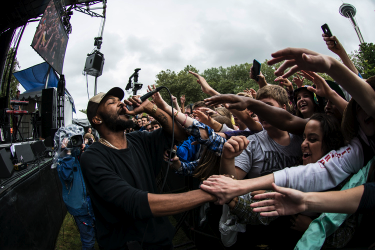
Q: When did you realize music was your passion and you wanted to pursue it as a career?
A: “When I was 14”.
Q: How’d you realize that?
A: “Because I started out in poetry, like Youth speaks that why I connect with you guys. There’s a lot of other kids who have been in the same space. At first, I didn’t realize that music had power, I knew words were very powerful. And when I was like watching movies and even being in church I saw how music really moves people. The pastor plays music before he passes the tithing bowl around, or plays music when there’s an intimate prayer going on and putting hands on someone. If you take music away from those moments the experience is just not that moving. Same with movies, if you’re watching a scary movie or any kind of movie, a tearjerker, and you turn it on mute, it doesn’t have the same effect. So visuals are powerful, words are powerful but then the music is very powerful. You put those altogether, it’s like damn. So when I realized that, I wanted to bring my poetry to music, and start making music”.
Q: When you were younger what was the music that was moving you?
A: “I didn’t really listen to music before, some soul, some Christian rock, like church stuff. I wasn’t listening to anything. And then when I started making music, I was like ooh, I can’t listen to anything. I have to do my own, I have to have my own style. I am developing and I know humans are very impressionable. When I was younger, I thought “I am a leader, I know who I am, I don’t need to find myself, what’re these people talking about finding themselves!? “I’ve been the same person since day one” and then I realized, we have to find ourselves, then we have to build ourselves. Then we have to break ourselves down and build again. And I realized I too am very impressionable. And the sub conscious is something that gets affected to. I consciously made the decision to not listen to any music at all. Like I’d be in the car and I’d be with the homiest and they’d have the radio playing. I’d be like “nope! Turn it off! Or I got to get out.” And now I kinda feel like I got my established sound even though I’m still building and doing other stuff, I’m nowhere near where I want to be. But like I know how to convey my message. I know how to get out how I am feeling exactly the way I want onto the song. And that’s all I’m worried about. I’m not really worried about the competition about it. So now that I am doing it I could go out and listen and learn. You know, go to a symphony, go to a folk rock show, listen to some other rappers which is some stuff I’d never do, and really know what’s going on. One, so I don’t do that, and two because I like to see different techniques when it comes to production, coos’ I do all the productions. So now I can learn from stuff like that”.
Q: What’s the most comfortable place to create, or write?
A: “The place I find myself in is my car, a lot of times. I used to have an Ipad that I’d write a lot of stuff on. I kept flip phones because I didn’t want to be all; smart phoned out yet. So I’d have my Ipad on the steering wheel on the freeway, writing, like driving with my knees. Then I was like no, this is not good. I’d be driving, pull over, end up pulling over in random spots, somewhere where the police probably end up coming like “Umm, you ok sir?” I’d just pull over in the most random areas because it’ll happen and I need to write. You know, anyplace where I’ve gotten my alone, kinda closed out. A place I really like to write now a days is a place like a canyon, a silent place in the world, but I still haven’t really got there yet”.
Q: How do important do you feel Youth Speaks open mics are to the youth?
A: “Really important, the last Youth Speaks event I went to was a couple months ago. And it was packed out like it was a lot of people there. And that shows that it’s important, because all the people coming out and it means a lot and people have identity in their writing and get empowered by their writing like “I didn’t know I could do this.” It empowers people a lot. It’s one of those things that if it left, there would be a void that needs to get filled. When you’re sitting down writing a lot sometimes at the end of you writing something you’re like “I didn’t know I could do that” sometimes I’m like “Who wrote this? I wrote this? I said this? Like that? That’s… that’s dope.” Pat myself on the back type stuff you know? And that happens a lot you know even with people that don’t write at all. And just reading something they’ve written, it’s like “This is amazing.” And “I could see into you more than I can just by having conversation with you.” Because you know it take so much to get into a deep conversation to occur. It’s not like it’s just “Lets sit down and have a deep conversation”, but with poetry, in writing, you could sit down and really think about exactly what you want to do and calculate and really put out your soul on there. So I think it’s great”.
Q: Any last words on youth pursuing art as a career?
A: “Don’t do it unless you love it more than everything, if it’s your passion than go all out and just do that. I wouldn’t say don’t do anything else, but fuck everything else. Don’t let school come in the way of that, don’t let your parents. Your parents are going to be dead when you’re an adult, just to be real! And on top of that your parents are going to love you no matter what, hopefully unless they’re shitty ass parents and if they’re shitty ass parents than fuck em too. So either way, your parents are going to love what you do and they’re going to get over it. You know, my moms, I had my son when I wasn’t supposed to, I was under age, and she hated that. But when he came out she loved him and I have the best relationship with my mom. You always go through those times, but they get over it. I know so many people with those parents who are like “No, I need to be a doctor, a lawyer, I need to go here they’re going to pay for my school.” Different things like that. And I hear you, but all those validations, you really have to think about what you want at the end of the day. Money doesn’t mean shit, at the end of the day when you realize that you’ve been stacking all this money and then everything’s gone and you realize you can’t eat money. The shit doesn’t mean anything at the end of the day. It’s just cool, you can get some cool shit, get some shoes, fuck em up and be tired of em. You know, so don’t worry about money, don’t worry about all the validations, do what you want, and do what you love, and you’ll see when you put in your 1,000… 10,000 hours into something, no matter what it is. Even if you like building gum sculptures on the side of the road or something, someone’s going to be like “this shit is dope” and for sure there is going to be a way that you can get paid and be rich of that if you really want to but don’t let that be the end all result. You do this because you love it. And if the money come in and comes in the right energy than… that’s cool. If it doesn’t come in the right energy, than don’t take it. That’s what I say”.
Jarv Dee
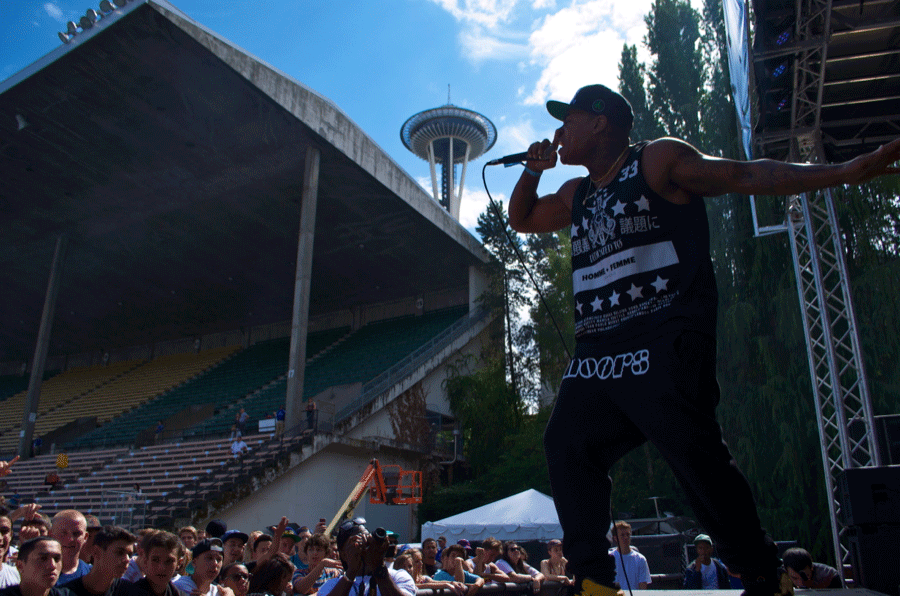
Q: How old were you when you realized you wanted to pursue music as a Career?
A: “Well I was doing dancing for years, since middle school, I was doing tap dancing and popping and junk. I was also doing music in high school. I didn’t really take it seriously until… I was about…20…23. Then I really just started going in on it”.
Q: When you were making music or any type of art in high school did you find it easy or were people like “Naw, we don’t fuck with you, you’re just a high schooler”?
A: I didn’t put nothing out like that. You know you got those tracks you play for the homies and shit. But I never really put it out there like that, you know I was just dancing, nothing else.
Q: when you’re writing, creating music, what’s the setting? What makes you the most comfortable to create?
A: Actually anywhere! It’s just when the spark hits it hits. In my room, in the bathroom, it could be anywhere. I would say it’s not really about the comfort. Just when the spark hits me. When I feel a certain way. I can’t say a quiet room, because you know, sometimes I like a little noise in the background. You know”?
Q: How has being a creative person and musician shaped your life both positively and negatively?
A: First negatively, it really hasn’t. I’m still a regular person, I get up, go to work, it has me saying out later, that’s about negative as it gets. You know, but shit I don’t care. But positively, I’ll say… Everything man. Everything I’m getting to do right now it’s all positive. I wasn’t able to do this before. You know the opportunities I’m getting now that I wasn’t getting before like opening up for Wiz and Snoop. And opening for Bun B. and just different artists I grew up looking at. It’s a good achievement man. it makes me feel good about doing it. Keeps me motivated to keep making music.
Q: What success have you had that surprised where you were like “Damn, I’m here”
A: “The reaction to the music, really. You know, you put a lot of yourself into your music, you’re always taking a risk when you put it out there. You don’t know if people are going to like or be like “Naw I don’t fuck with it” you know? But there’s always going to be some person that could be across the world that could hear it, and feel it you know. Yeah Just the reaction to the music”.
Q: We’re from Youth Speaks Seattle so we’re constantly at open mics, and poetry slams, how important do you feel those are to the city?
A: “They definitely are because, I grew up in a place and did acting at a place called Langston Hughes in the central district. So I did lots of plays there and everything. That got me prepared to do stage stuff like this. You know, not to be so nervous, and be comfortable and prepared, I think having open mics and stuff like that it brought a lot of people together. Know what I’m saying, it might bring two cats together to start a group. It just brings a lot of opportunities and exposure. You want to hear what’s going on in the town, there’s a lot of people, a lot of different sounds. It’s just a good opportunity, a good platform for people to put out there stuff”.
Q: How important is it, as an artist to connect with all the up and comers?
A: “It’s definitely important to listen. [Glenn of ILLFIGHTYOU interrupts to tell Jarv He fucks with his music] it’s important just to listen, it’s definitely important to listen because sounds are always changing. You just want to hear what’s going on around you. I don’t listen to everybody, you know I’ll listen here and there, I like to keep all focus, and I don’t want to sound like nobody. It’s important to keep in touch with other people from the town, it’s like a chain thing, you know, most the cats in MOOR Gang are younger than me, there’s generations. Keep the Music alive! Keep that rotation in the town”.
Q: any last advice to youth who are pursuing music as a career?
A: “If you are going to do it, go ALL in. if you don’t want to struggle, work. Never feel ashamed to grind. There’s no wrong to grinding, you know a lot of people are scared if they’re rapping or whatever to actually have a job. You got to survive man, got to be able to maintain. If you’re going to go after it, grind, work, do whatever you have to do keep yourself a float so you can keep making what you want to make. It starts off as work, but I feel that music is never really work, it’s always fun. If I could live off my music I’d be happy, I don’t have to be a millionaire. But if I can travel and perform for cats I’m happy with that”.
Gifted Gab
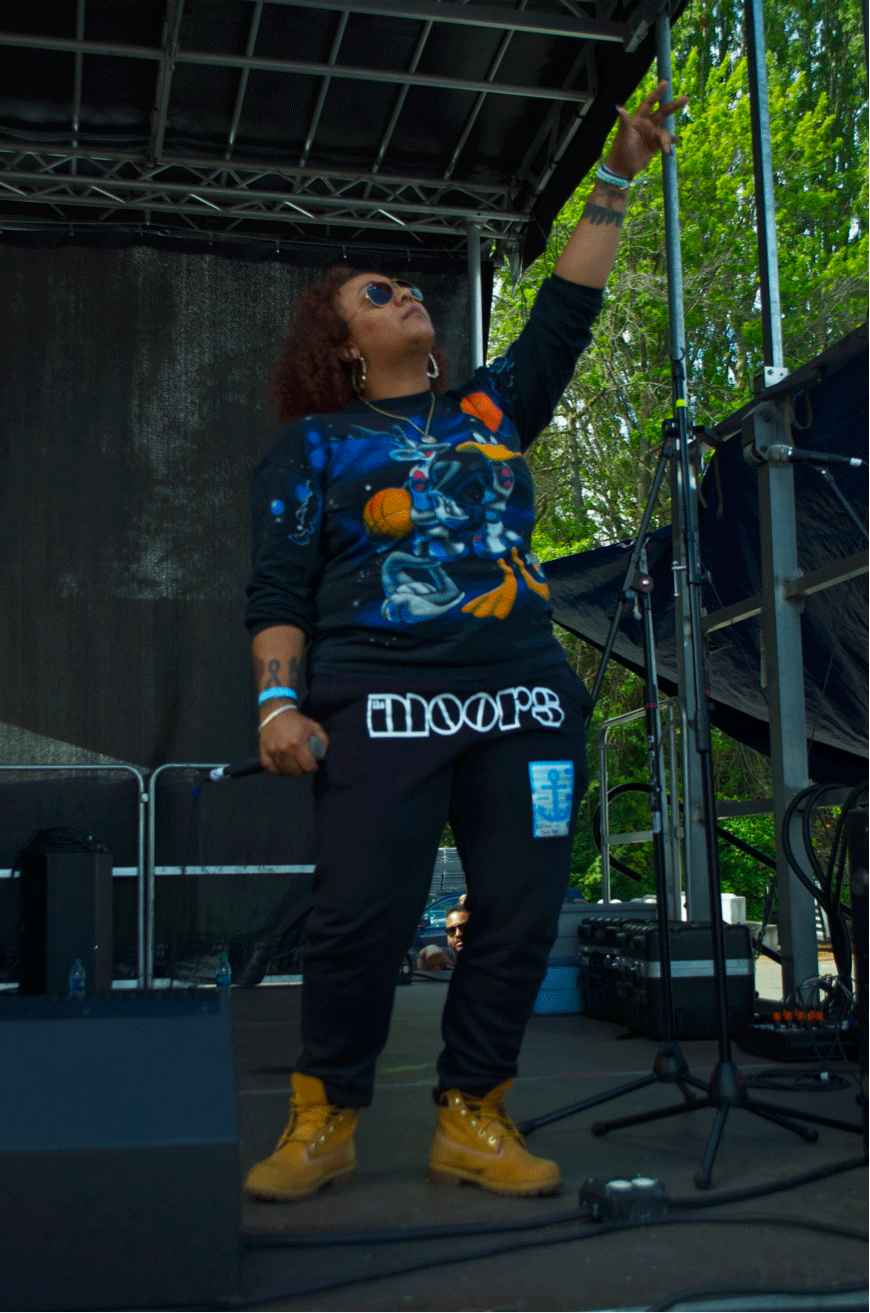
Q: How old were you when you realized music was your passion?
A: “When I came out the womb! I wasn’t even talking but I was thinking of raps! Nah I’m kidding. My earliest memories were probably around 4 or 5, my mom had a lot of records, and I remember just playing records”.
Q: How did you start to realize you wanted to do it as a career?
“It took awhile. I’ve been taking it serious for probably the last 4 years, but it wasn’t till about 2 years ago when I finally said “alright this is what I wanna do”! Because I always liked it and it was sort of a side thing, but you know, now it’s sort of taken over my life! Haha”!
Q: How do you prepare yourself to get in the zone to create art, or does it just come to you?
A: I’m more of an ‘it just comes to me’ kind of artist, if I just sit down and try to focus really hard it just doesn’t come. I’ll be hanging out with my friends and I get an idea and I go ‘alright guys, I’ll be right back’! Haha”!
Q: Is there a certain type of music you gotta’ always listen to?
A: You know, I get inspired a lot by Dj Quik and shit like that. Just the overall song from the beat to the lyrics to the way he rides the flow. I always push a lot of my producers too do that, I’ll show them that and be like ‘aye, kind of do that’!
Q: How important do you feel youth speaks and open mics are to the city?
A: “I think its very important and I don’t think they really realize it. I remember the first one I went to was at the beginning of this year and y’all were doing them at The Station coffee shop on Beacon…man I was there one time and it was hella’ dope! It was phenomenal! I was like these ids should be speaking to people in huge stadiums or something! I think they are extremely important, I think all schools should incorporate stuff like that into their curriculum.
Q: When you were going to school were you heavily into making music but not putting it out?
A: “Pretty much! I always did a lot of writing, like a lot of my stuff on ‘Queen LaChiefah’ I probably wrote in like 2007 or 2008 but I didn’t put the EP out until 2012. When I hear it its just so funny because I was like 15 when I wrote that”!
Q: Any last advice to youth pursuing art as a career?
A: “Do it! Even if you don’t want to pursuer it as a career you should still be making art. It’s a great outlet. Like I always say: some things don’t always come out well, until you say them over a beat. At a young age I realized that if I said the same thing that people didn’t like over a beat…they would like it! Haha”!
Otieno Terry
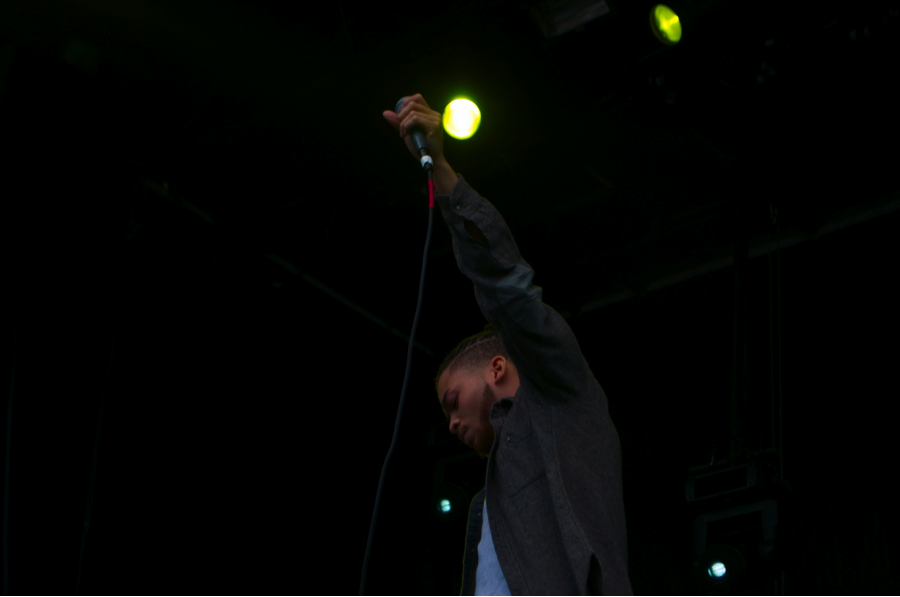
Q: At what age did you realize music is your passion and what made you realize it?
A: “At 14 I was playing guitar and my girl broke up with me and that made me I realize that. It was actually my freshman year in high school. And that was when I wrote my first official song”.
Q: Do you come from a musical family?
A: “Somewhat. Yeah definitely I have a lot of people that support me musically. I have a lot of cousins, most of my family listen to a lot of music and that’s really where my passion grew from”.
Q: As a highschooler where are you finding your inspiration to make music?
A: “French DJs and I was in that jazz choir at Garfield high school and I was surrounded by music almost all the time. I knew a lot of rappers to, a lot of different kind of music. I started a rap group in high school”.
I was just always around it, it kinda kept fueling me to go and it was just fun it got me away from a lot of high school bullshit.
Q: We saw you at a few youth speak open mics back in the day, how important do you feel those are to Seattle?
A: “Preeeetty important. I think that having a place for youth to express themselves is essential. Even in youth health, having a place to express themselves and a safe place to develop their artistic endeavors. Youthspeaks was the first place not only that I could do it but where I could feel comfortable doing it feel like I was the shit because everyone was always screaming and stuff for me”.
Q: What’s troubles have you had to overcome pursuing art and as a musician?
A: “As a human just life you know, I feel like we live in a world, especially in a hyper masculine society where art is really suppressed, and anytime you express it you’re labeled as an extremist. [You’re seen as] Someone who’s just against the world. And sometimes we are as artist sometimes where again is the way things are, but I feel like deep down everyone really wants, everybody wants balance, everybody want to express themselves, everybody wants to be whole, so you have the biggest struggles is excepting myself. In a world that is constantly telling you that you are not normal, You’re not healthy, you’re not good enough yeah so that’s probably in essence my biggest struggle”.
Q: When you’re getting ready to perform or make music what reminds you to be yourself?
A: “Other music honestly, my reflective music is like really stoic stuff like choral irvine piano music really like stuff I didn’t have any side and you could tell us is made out of beauty and you can tell it’s intention was just to be played because it is beauty full because they loved it. And when I listen to that kind of allows me to reflect on myself. When you get to see, hear; experience something beautiful you see the beauty inside of you. So when I’m out of the zone and I need to get back into it I just look for beautiful things. That’s what reminds me, that’s what fuels me because like everything is beautiful. Everything can be if it wants to. It’s just a matter of getting your mindset into that light you know. Perspective is light , so when you find that light you find that your truth”.
Acknowledgements:
Thank you to Arts Corps and OneReelPress for giving us the opportunity to have this experience. Also all the artists and managers who coordinated this with us to make this article happen. We love you.
And to all reading this…don’t stop making art. We need it.
-Travis Thompson
